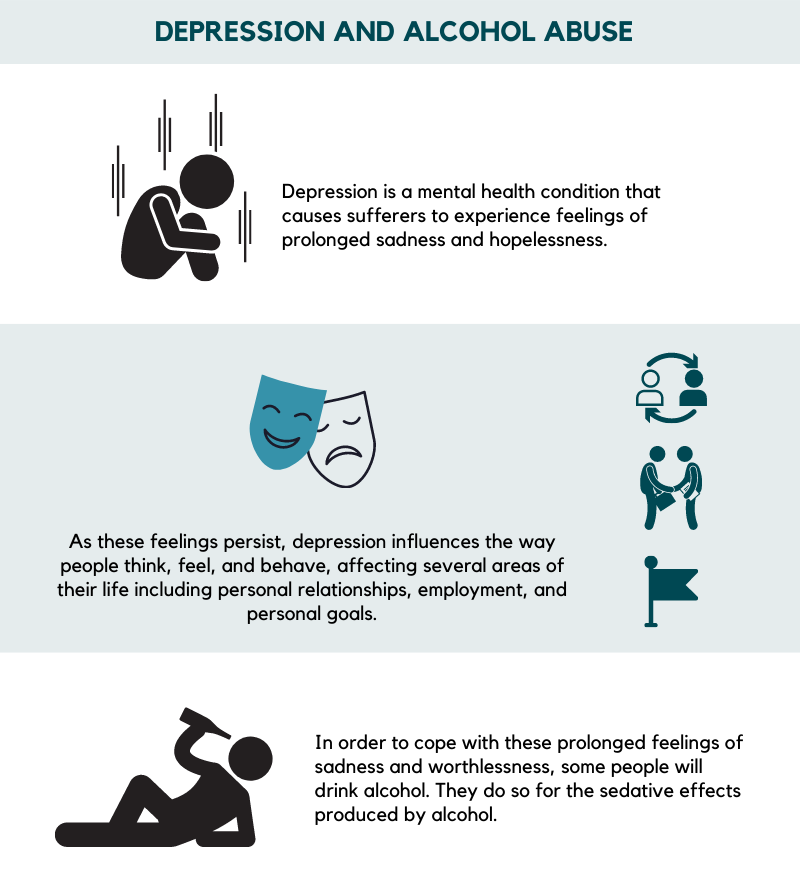
25 Sep The Link Between Alcohol Abuse and Depression
Depression is a serious mental health condition that causes people to suffer from persistent and chronic feelings of worthlessness, sadness, and unhappiness. People who struggle with depression are at risk for a variety of additional medical conditions, ranging from diabetes to heart disease and alcoholism. Alcohol abuse and depression have a complicated relationship, as depression is a major contributing factor to developing alcoholism and alcohol abuse is a preceding factor for depression.
While individuals who suffer from depression are more likely to abuse alcohol than others, people who abuse alcohol are also more likely to develop depression. Whatever a person’s relationship between alcohol and their mental health may be, people who struggle with co-occurring disorders such as alcohol use disorder and depression can benefit from seeking professional dual diagnosis treatment.
Understanding Depression
Depression is a mood disorder that is characterized by chronic feelings of sadness and loss of interest. There are many different types of depression that all affect the way a person thinks, feels, and behaves. As a result, it can lead to a variety of physical and emotional problems in one’s life. Depression is far more than feeling down or upset. It is a long-term condition that requires medical and psychiatric treatment.
Some of the different types of depression are:
- Major Depressive Disorder – this is the most common type of depression that is also known as clinical depression. Individuals with major depressive disorder will cycle through stages of depression and stages where they are symptom-free.
- Seasonal Affective Disorder – SAD is a condition where individuals experience symptoms of depression during the fall and winter months when the amount of daylight decreases. However, their symptoms tend to subside during the spring and summer months.
- Bipolar Disorder – bipolar disorder, sometimes referred to as manic depression and bipolar depression, is a condition where people experience alternating periods of mania and depression.
- Persistent Depressive Disorder – a condition where a person struggles with a depressed mood that persists for two or more years. Persistent depressive disorder is a continuous condition that may last for a lifetime but can be managed with medication and treatment.
- Postpartum Depression – this form of depression is caused by the physical, hormonal, and emotional changes associated with pregnancy, birth, and caring for a newborn.
- Psychotic Depression – individuals who suffer from both severe depression and psychosis are said to have psychotic depression.
Fortunately, all types of depression can be effectively managed with medication, counseling, or a combination of both.[1]
Alcohol Abuse and Depression: Understanding the Connection

Depression is a mental health condition that causes sufferers to experience feelings of prolonged sadness and hopelessness. As these feelings persist, depression influences the way people think, feel, and behave, affecting several areas of their life including personal relationships, employment, and personal goals. In order to cope with these prolonged feelings of sadness and worthlessness, some people will drink alcohol. They do so for the sedative effects produced by alcohol.
Alcohol may momentarily reduce one’s symptoms of depression, such as loss of interest, insomnia, anxiety, and irritability, but long-term alcohol or drug abuse will only worsen depression. For many people with depression, drinking is a way to relax and achieve an escape from reality. However, abusing alcohol to cope with depression is considered self-medication, and is never healthy. This often leads to a toxic cycle of alcohol abuse, self-medication, and worsening depression.
On the other hand, people who abuse alcohol may develop depression because alcoholism increases the risk of depressive symptoms and other mental health conditions. Heavy alcohol use alters the way neurotransmitters like dopamine and serotonin are produced in the brain. Dopamine controls the brain’s reward system, so when the brain gets accustomed to having it in excess, users get addicted to the substance that produces the dopamine. Serotonin, on the other hand, is a neurotransmitter than help’s balance mood. In the long term, high levels of dopamine and serotonin can trigger depression symptoms and other health issues.
Since depression may lead to self-medication and alcoholism and heavy alcohol abuse can lead to depression, it is easy to see how these two conditions are related. More than 300 million people worldwide experience depression and almost 30% of Americans experience an alcohol use disorder at some point in their lives.[2]
Symptoms of Depression
Depression may occur once during a person’s life, but most people struggle with multiple episodes for extended periods of time. Symptoms may begin at any age, but most frequently begin during the teens, 20s, or 30s. Depending on the type of depression a person is diagnosed with, they may experience any of the following symptoms:[3]
- Angry outbursts or frustration and irritability over small matters
- Persistent feelings of sadness, hopelessness, or emptiness
- Losing pleasure or interest in normal activities like sex, sports, or hobbies
- Insomnia, sleep disturbances or sleeping too much
- Feeling so tired that small tasks take extra effort
- Lack of appetite leading to weight loss or overeating leading to weight gain
- Feeling anxious, agitated, and restless most of the time
- Exhibiting slowed thinking, speech, or body movements
- Having feelings of guilt, worthlessness, or shame
- Difficulty thinking, concentrating, remembering things, and making decisions
- Having recurrent thoughts of death, suicide, or suicidal attempts
- Unexplained physical problems like pain or headaches
Alcohol is a depressant, but can also boost one’s mood temporarily. So, people with depression may abuse alcohol to relieve sadness, fall asleep, and feel happy. Oftentimes, the symptoms of depression are severe enough that people realize there is something wrong. Others simply can’t identify what is wrong with them or why they feel miserable.
Treatment Options for Depression and Alcohol Abuse
Depression is a serious condition that can seriously deteriorate an individual’s quality of life. For example, people who struggle with depression may have a hard time maintaining healthy relationships, staying physically healthy, and simply enjoying life. Sadly, only a small number of people with depression seek professional treatment. Similarly, experts estimate that only 10% of people with alcohol use disorder receive the help they need.[4] People who struggle with both alcohol dependence and mental illness like depression often face a number of false stigmas and feelings of weakness that prevent them from seeking help.
Fortunately, there are many treatment options available for people with depression and alcohol use disorder. First, patients must safely detox from alcohol. Alcohol detox should always be done in a medical setting where doctors can monitor one’s symptoms and prescribe medications to relieve their symptoms. Alcohol withdrawal can be fatal, so anyone who is addicted to alcohol must detox before they can move forward with treatment.
After detox, patients with depression and alcohol use disorder should attend dual diagnosis treatment programs that provide care for both mental health and addiction. Depression is often treated using antidepressant medications, but it is also useful to combine medication with behavioral therapy. Some therapies that may be used at dual diagnosis facilities in the treatment for depression and substance abuse include:
- Cognitive-behavioral therapy (CBT)
- Dialectical behavioral therapy (DBT)
- Holistic therapy
- Peer support groups
- Family therapy
Since depression and alcoholism exacerbate the symptoms of one another, it is crucial to treat both conditions simultaneously.
Get Help Today
Being stuck in the cycle of alcohol abuse, depression, and self-medication can make anyone feel hopeless, but we’re here to let you know that recovery is entirely possible. Drug and alcohol treatment facilities in Delray Beach are prepared to provide you or your loved one with quality mental health and addiction treatment that will help you get your life back on track.
If you’re ready to get started on the road to recovery, contact one of our dedicated treatment providers today.
References:
- https://www.healthline.com/health/types-of-depression
- https://www.healthline.com/health/mental-health/alcohol-and-depression#coexisting
- https://www.mayoclinic.org/diseases-conditions/depression/symptoms-causes/syc-20356007
- https://www.niaaa.nih.gov/alcohol-health/overview-alcohol-consumption/alcohol-use-disorders





